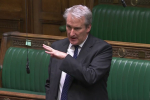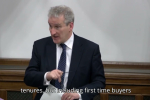
Lord Darzi’s report into the NHS landed with great fanfare recently. It did feel rather like the first stage in a ‘pitch rolling’ exercise at the end of which may be some major changes.
It is a pretty scathing review of the health service which complements a narrative from ministers. So negative, indeed, has their narrative been that the BBC last week reported on “growing unease” within the NHS about the "broken" messaging coming from government, which could be bad for both patient confidence and staff morale.
Lord Darzi is himself a former Labour minister. If his name seems to ring a bell it may be from the late 2000s and the spectre of polyclinics, or ‘Darzi clinics’ being put in place of GP practices. You can see how the plan might have worked in, say, London, that it was originally designed for, but there were major concerns in East Hampshire and elsewhere. The plan was scrapped with the change of government in 2010.
Lord Darzi does acknowledge the huge amounts of extra spending on the NHS by the last government. The capital spending part of this includes the now almost completed Accident and Emergency department at the Queen Alexandra Hospital in Portsmouth.
But despite hospitals having more money and staff than ever, the NHS has found it hard – exacerbated by the backlogs that built up and persisted after Covid – to cope with the demands on its services.
A few days after the report, the Prime Minister pledged the biggest “reimagining” of the NHS since its birth. We won’t know the full implications of what that means until next year, although we are told it will cover three broad areas: creating a digital NHS, moving care from hospitals into the community and focusing on prevention.
I can’t disagree with any of those themes. Indeed these are important areas for reform. But the Prime Minister is being naive if he believes such reform is possible without more funding.
I was on the panel on Question Time with Wes Streeting, now the Health Secretary, at the start of the election campaign. Mr Streeting spoke of increasing emphasis on primary care – again nothing amiss with that – but the unavoidable implication was resources moving out of hospital care. Historically, it has tended not to work to try to reduce; rather you need to add.
We have a great example of a community hospital in Alton, with diagnostics, antenatal, orthopaedic and respiratory clinics, as well as rehabilitation and palliative care. In Petersfield, the Urgent Treatment Centre means people can get same day treatment for minor injuries, plus x-rays and blood tests, without having to go a major hospital. Yes, we should drive for more of this.
Lord Darzi is also right to focus on prevention. If the NHS is going to continue to be a ‘cradle to grave’ service, it needs to start with prevention – always, as the saying goes, better than a cure. Social prescribing and public health programmes such as on smoking cessation have important roles to play. We did get some good news last week on obesity – some of the credit for which is ascribed to the ‘sugar tax’ (officially known as the Soft Drinks Industry Levy) which I was involved with when I was at the Treasury.
More services can be provided in primary care, and that will ease pressures on the main hospitals. But we also need to ensure we don’t have excessive structural change. Our family doctor practices are the bedrock of primary care, popular and trusted locally.
Lord Darzi also points out that parts of the hospital estate need urgent capital investment. He is right. The previous government’s new hospitals programme (currently on hold pending a review by the Health Secretary) now needs to proceed at pace – including the project for Basingstoke and North Hampshire.



